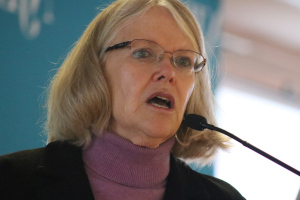If you’re a bookkeeper, artificial intelligence (AI) is coming for your job. And paralegals shouldn’t get too comfortable either, because they’re not far behind.
The good news, according to Jane Oates, the president of WorkingNation, is AI will create as many jobs as it replaces, if not more.
Data show automation is happening at an incredible rate, Oates said, adding that orders for industrial robots increased 19% in the second quarter of this year. In fact, industrial robots are now cheap enough that small businesses can have them.
“I was just at a small business in Massachusetts that had 150 employees and employed three robots,” Oates said. “The good news is it takes five people to keep those three robots running.”
That’s either really exciting or really scary, depending on your point of view. But from a policy perspective, it means we as a nation are teaching students skills that may well be obsolete by the time they hit the five-year anniversary of their first jobs.
Consider the way virtually every form of work today is augmented with technology that wasn’t even available when many of the people in the audience were still in high school. The landscapers who mow lawns and trim hedges now book their appointments online, Oates pointed out, and gig workers for companies like Uber are, in her words, married to their GPS.
“People have to understand whether they’re 6 years old or whether they’re 86, if they want to be in this workforce still, they’ve got to get digital skills, they’ve got to learn technology, or they’re just not going to make it in any job,” Oates said.
NJBIA has been advocating for the creation of a pipeline of skilled workers so employers will have the workforce they will need in the future. This morning’s The Future of Work event, held in conjunction with Einstein’s Alley, was dedicated to the details of figuring out how to fill that pipeline.
Oates, the event’s keynote speaker, offered a sobering assessment of how much further New Jersey has to go, even as she extolled the state’s workforce development initiatives as among the best in the country. For example, New Jersey’s Community College Consortium for Workforce and Economic Development and Career Tech NJ (vocational and technical education school districts) are unique.
That’s good news, because dealing with the challenges and opportunities that technological advancement presents is not going to get any easier.
“We have never been changing as fast as we have as of today, and tomorrow, it’s going to get faster,” Oates said.
To be successful, New Jersey needs more businesses to get involved with government training programs and developing curricula for colleges and even high schools and middle schools, NJBIA President and CEO Michele Siekerka said in her remarks.
“Academia and government can’t figure it out over here without you, and you can’t sit on the sidelines and say, ‘this is the talented workforce I need’ without being in the game,” she said.
Katherine Kish, executive director of Einstein’s Alley, pointed out that the news of the day is Google’s breakthrough in quantum computing announced today, potentially increasing computer speeds well beyond what’s available now. It begs the question: What’s the future for us?
“The day-to-day nature of work could change for nearly everyone as intelligent machines become fixtures in the American workplace,” Kish said in her opening remarks. “So as business leaders, policymakers and educators, we will need to work together to chart a new course.”


